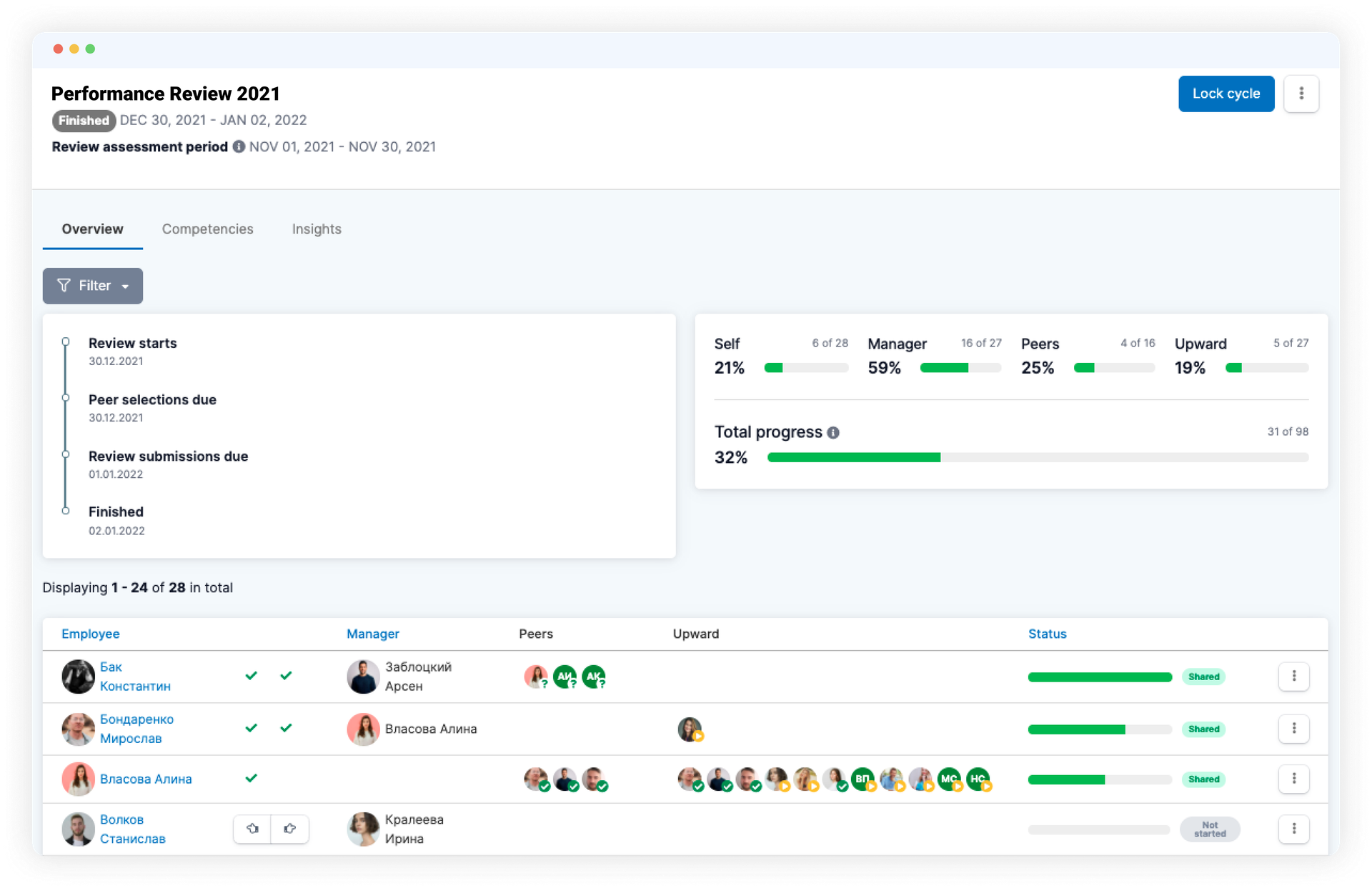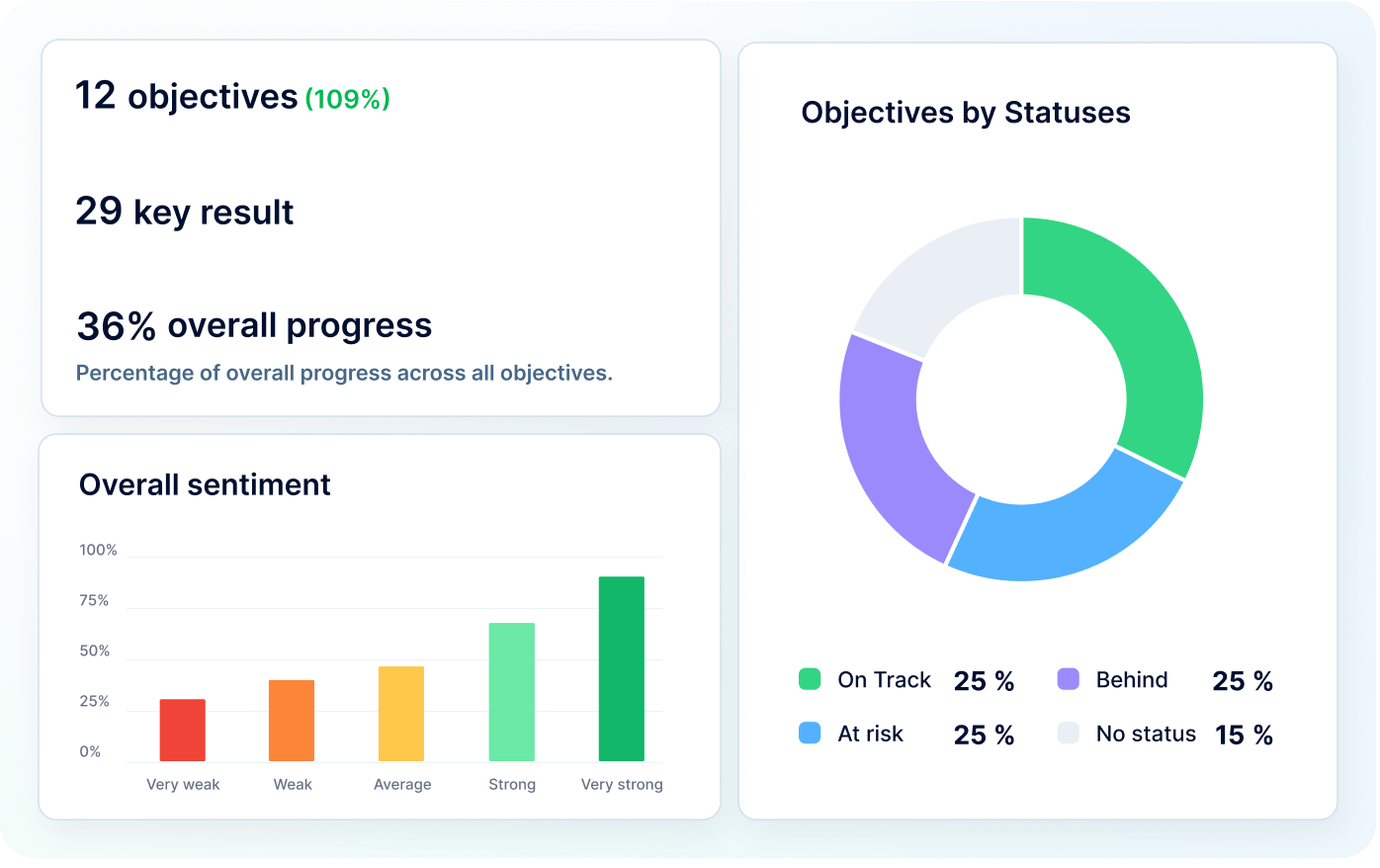
The role of employee assessment in driving success
Qualified employees are worth their weight in gold. Are you sure that only professionals work in your company? A justified answer to this question will be provided by personnel evaluation. What it is, how it is conducted, and whether it is necessary for your business — we discuss it in the article.
What is employee evaluation?
Employee evaluation is a regular analysis of competencies, effectiveness, professional growth, and work results of an employee in the company, providing feedback. Employee evaluation is part of the Performance Management System, which includes all working interactions between the employee and the manager.
Sometimes the term “ employee evaluation ” can be confused with “certification” — a legislatively prescribed check that determines how well the employee's level of training and qualifications fits their position. “ Employee evaluation ” has a broader meaning. It analyzes not only the appropriateness of the employee for the given job but also their effectiveness in achieving goals and how these goals affect the well-being and development of the company or, conversely, cause harm, for example: financial losses due to failure to meet tasks, lack of alignment with company values, negative impact on team atmosphere, etc.
Employee evaluation is a continuous cycle that consists of the following HR stages:
- planning: goals, desired outcomes, and competencies for each position are developed and written in advance;
- monitoring: observing progress, employee performance, and compliance with competencies;
- development: creating an individual training and work tasks plan;
- evaluation: analyzing assessments and summarizing results;
- recognition: acknowledging good results and providing verbal/material rewards.
We have figured out what employee evaluation is. It's time to understand what goals a company can achieve with the help of this HR tool.

Goals of employee evaluation
Employee assessment allows the company and management to achieve such important goals:
- Administrative: the assessment helps to find or confirm arguments for promotion, salary increase, bonuses, training, firing an employee, etc.
- Motivational: identifying the strengths and weaknesses of an employee, the potential of a specialist, wishes for professional or career growth, etc.
- Process-related: obtaining feedback, building corporate culture, preventing conflict situations, strengthening the relationship between supervisor and subordinate, etc.
Advantages of employee evaluation
Staff assessment is a specific investment by the company in its well-being, the resources spent on it can be justified by the benefits for employees and the business:
- Improving productivity. 92% of employees claim that even negative feedback, when delivered correctly and appropriately, can motivate an employee and ultimately improve productivity and effectiveness.
- Proper business development planning. By knowing the qualifications and potential of their employees, leaders and managers can effectively build development strategies and understand whether there are enough human resources or if there is a need to hire additional team members or specialists.
- Reduce employee turnover. Companies that provide regular feedback to their employees have a turnover rate of 14.9% lower than organizations where employees do not receive feedback.
- Create a positive work atmosphere. 68% of employees who receive feedback from colleagues and managers report satisfaction with their job. Additionally, feedback allows for assessing how each employee works within the team.
- Identify weaknesses. Interviews, tests, games, and surveys serve as a litmus test, showing what knowledge and experience a specialist needs to acquire for successful performance in their position. Based on this, management understands whether to provide additional training for the employee or take a different approach in the interest of the company’s development.
- Effectively upskill. Often, training sessions or workshops are conducted for all team members. However, for many employees, this may involve already familiar material, wasting time during such training. To avoid this common mistake, first assess what knowledge a team member is lacking and only then select the appropriate training. This way, you will save the employee's time and the company's money.
- Hire or fire specialists without regrets. Employee evaluations provide a justified assessment of which workers are in the right positions, how well their values align with the organization's, and which employees might be more comfortable in another company.
Are there any downsides?
A medal always has two sides. We've already discussed the advantages of employee assessments; now it's time to talk about the possible downsides. We hasten to reassure you, there aren't that many:
💡preparation for evaluation can take a lot of time, but fortunately, some routine processes and analytics can be automated with the help of HRM systems;
💡due to personal biases, employees may unfairly evaluate a colleague;
💡distrust in the evaluation can lead to disagreements within the team;
💡for a specific company, it is necessary to choose its own method, as not all methods can be equally practical for widespread use;
💡certain evaluation methods can only be conducted and analyzed by certified specialists.
Performance evaluation criteria
There are many methods for evaluating personnel, but they all share a number of common characteristics. Here are the main criteria for evaluating personnel that will confirm you are doing everything correctly:
- Clear objectives: the evaluation goals should be communicated to all participants so that employees understand why this is being done.
- Support from management and employees: the evaluation should be perceived positively by all company members, and potential costs such as evaluation forms, employee time, training, etc. should be approved by management.
- Predictability: employees should know in advance when and how the personnel evaluation will take place.
- Feedback collection: discussions of evaluation results are one of the most important stages that should not be overlooked.
- Adaptation of evaluation methods: assessment methods should be regularly reviewed to ensure they are suitable for your business.
How is employee evaluation conducted?
New employee assessment methods regularly emerge. This does not mean that all of them are perfectly suitable for every business and can solve absolutely all problems. Each approach has its own goal and way of achieving it. We suggest you familiarize yourself with the most popular methods so that you can choose the best one for you.
With over five years in HR tech content creation, Maria explores how technology, people, and culture shape the workplace of today. Her interests include HR, AI, IT, and personal development, and she brings a data-driven, human-centered perspective to her writing.
Get started with PeopleForce today
Automate your HR routine to create a high performance culture in your company. PeopleForce is your best HRM alternative to stay business driven but people focused.

Recent articles
Impressive and effective. How to evaluate employees using the Performance Review method?
Performance Review is one of the most comprehensive ways to assess an employee both quantitatively and ideologically. What exactly influences the success of your company?
10 minutes on professional competencies: How to apply them in performance review
Explore how competencies are essential for driving efficiency and predicting employee success. This article guides you in creating a comprehensive list of competencies and identifying key performance indicators for each.
How HRM tools help address underperformance
Employees can be a company's greatest asset in achieving its corporate goals. Achievements depend on how the team handles its primary responsibilities

